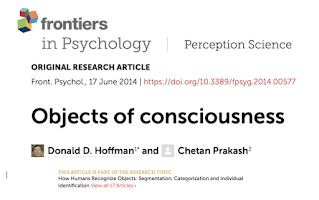Defending Physical Reality. Because, apparently somebody needs to. Feel free to copy and share.
This overall project is intended as a student resource for an in-depth critical examination of Donald Hoffman's: The Case Against Reality; Why Evolution Hid the Truth from Our Eyes. In a previous section we did a detailed chapter by chapter review (index at the bottom of this page), including many links to authoritative resources that support my claims.
In this section I’ve copied and reproduced the complete 21 questions and responses section from Hoffman/Prakash's Frontiers of Psychology paper 2014 Objects of Consciousness paper, which helped lay the foundation for his book. This review will be spread out over four installments, I haven't changed any text, simply added my two cents worth.
I don’t pretend to be any sort of scholar or self-made expert, no indeed, this is closer to a student’s exploration. Since I like homework more than most, I don’t mind sharing my process and the fruits of my hours' worth of effort, in the hope it can help others save time.
I want to make my trail of discovery and adventures in critical thinking available to others with whom these themes resonate - especially those who also possess a desire to defend serious science against the current onslaught of strategic deception for fun, power and profit.

https://doi.org/10.3389/fpsyg.2014.00577
~~~~~~~~~~~~~~~~~~~~~~~~~~~~~~~~~~~~~~~~~~~~~
Objections and Replies (1-12 of 21)
Donald Hoffman: Here we summarize helpful feedback from readers of earlier drafts, in the form of objections and replies.
Cc: The objections are printed in blue, author’s responses in mauve, my comments in dark green. Supplementary information is clearly marked. Most titles are linked to original sources.
(1) Your definition of conscious agents could equally well-apply to unconscious agents. Thus, your theory says nothing about consciousness.
DH: Even if the definition could apply to unconscious agents, that would not preclude it from applying to consciousness, any more than using the integers to count apples would preclude using them to count oranges.
Cc: Nor does it preclude applying to the totally imaginary. The response also hints at an unwillingness to acknowledge the difference between, “Saying something” of substance about human consciousness, and simply “doing math.”
(2) How can consciousness be cast in a mathematical formalism without losing something essential?
DH: The mathematics does lose something essential, viz., consciousness itself.
Similarly, mathematical models of weather also lose something essential, viz., weather itself. A mathematical model of hurricanes won't create rain, and a mathematical model of consciousness won't create consciousness.
The math is not the territory. But, properly constructed, mathematics reveals the structure of the territory.
Cc: But consciousness is not a geographic space that can be described using coordinates and vectors.
Consciousness is a complex interaction with the outside world and the inside of our bodies. It’s not limited to the brain. Where does all that get represented within Hoffman’s formulas?








